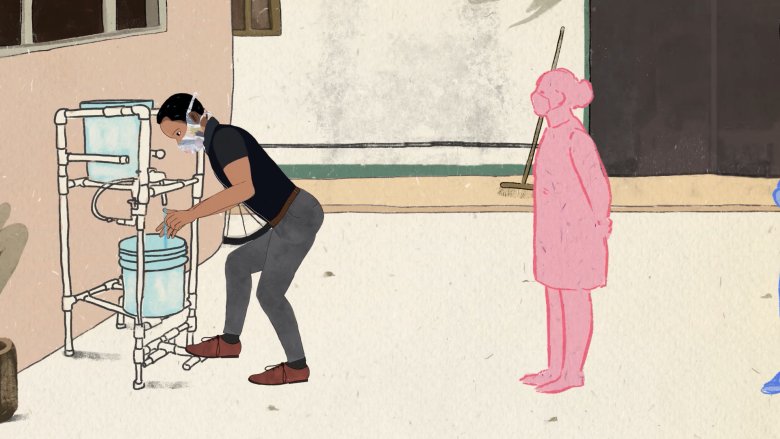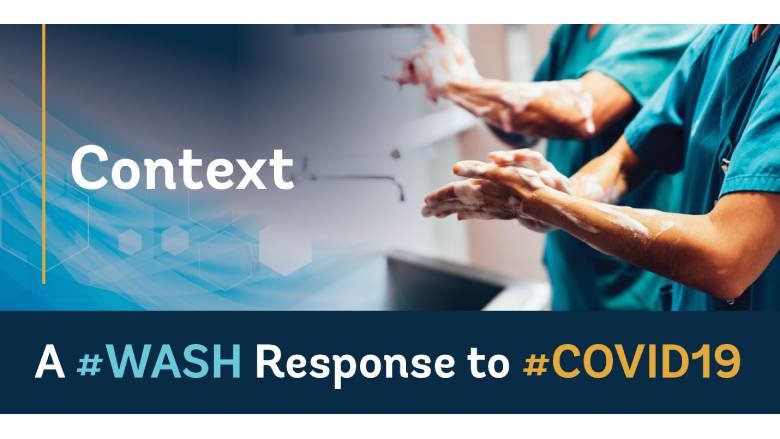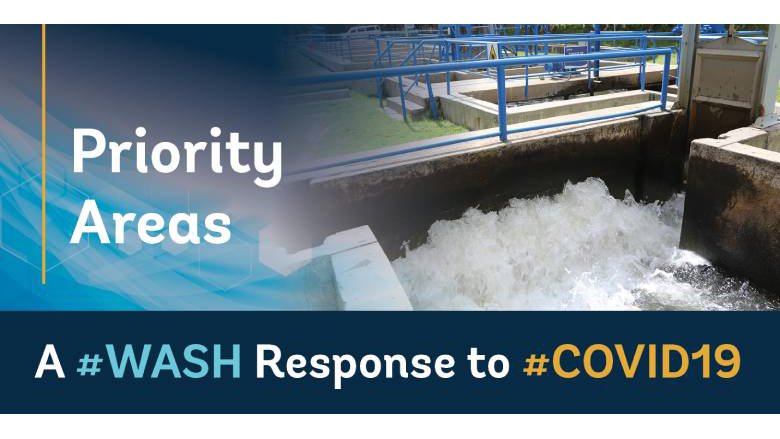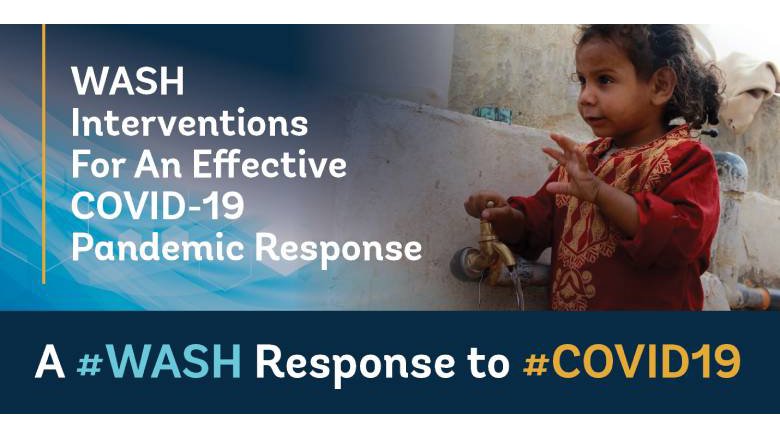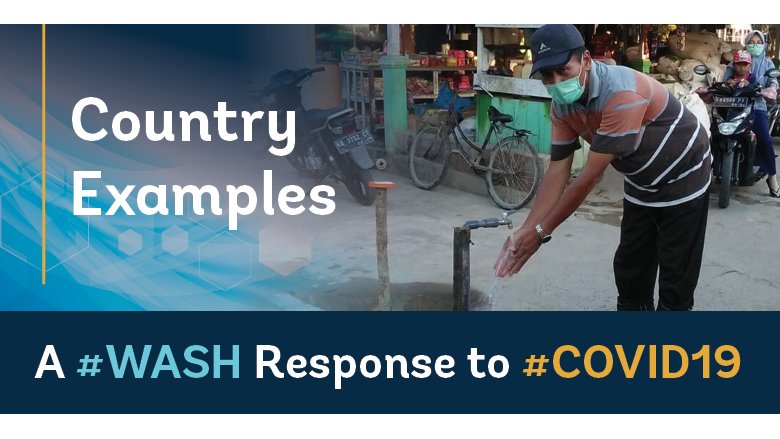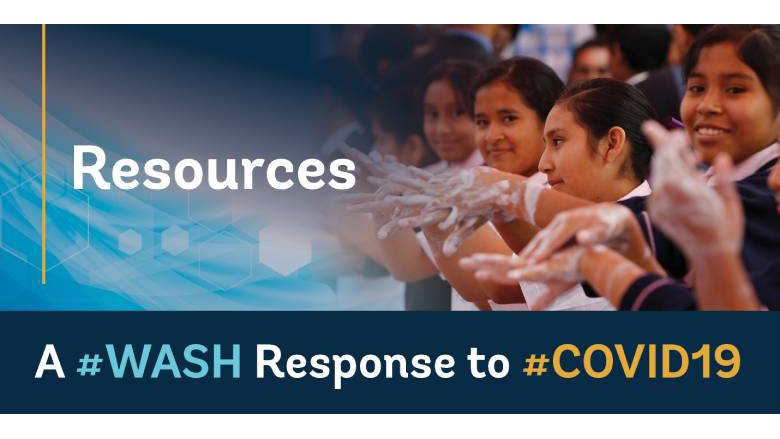Safely managed water, sanitation, and hygiene (WASH) services are an essential part of preventing and protecting human health during infectious disease outbreaks, including the current COVID-19 pandemic. One of the most cost-effective strategies for increasing pandemic preparedness, especially in resource-constrained settings, is investing in core public health infrastructure, including water and sanitation systems. Good WASH and waste management practices, that are consistently applied, serve as barriers to human-to-human transmission of the COVID-19 virus in homes, communities, health care facilities, schools, and other public spaces.
Safely managed WASH services are also critical during the recovery phase of a disease outbreak to mitigate secondary impacts on community livelihoods and wellbeing. These secondary impacts��which could include disruptions to supply chains, inability to pay bills, or panic-buying��have negative impacts on the continuity and quality of water and sanitation services, the ability of affected households to access and pay for WASH services and products (for instance, soap, point of use water treatment or menstrual hygiene products) and the ability of schools, workplaces and other public spaces to maintain effective hygiene protocols when they re-open. If not managed, secondary impacts can increase the risk of further spreading water borne diseases, including potential disease outbreaks such as cholera, particularly where the disease is endemic.
According to a WHO/UNICEF technical brief on WASH and waste management for COVID-19:
Frequent and proper hand hygiene is one of the most important measures that can be used to prevent infection with the COVID-19 virus. WASH services should enable more frequent and regular hand hygiene by improving facilities and using proven behavior change techniques.
WHO guidance on the safe management of drinking water and sanitation services applies to the COVID-19 outbreak. Measures that go above and beyond these recommendations are not needed.
Many co-benefits will be realized by safely managing WASH services and applying good hygiene practices. Such efforts will prevent other infectious diseases, which cause millions of deaths each year.
Beyond the human tragedy, devastating economics impacts are anticipated in all countries and for the most vulnerable and marginalized people in society. Human and economic costs are likely to be larger for Fragile, Conflict, and Violence (FCV)-affected countries and lower and middle-income countries, that generally have limited coverage and capacity of water supply and sanitation systems, lower health care capacity, larger informal sectors, shallower financial markets, limited fiscal space, and poorer governance. As such, for all interventions it will be especially important to target FCV-affected countries��home to about two-thirds of the world��s extreme poor. While it is too early and with too many variables to quantify the economic costs of the pandemic, the costs of inaction would be catastrophic.
Action in the WASH sector is therefore critical for both containing the virus and lowering its immediate impact and aftermath. Three priority areas are identified as part of the emergency response:
Safe WASH services in health care facilities (HCFs) to deliver quality health services; protect patients, health workers, and staff; and to prevent further transmission. The WASH in Health Care Facilities Global Baseline Report (JMP, 2019) highlighted that one in four HCFs lacks basic water service (affecting more than 900 million people), one in five HCFs has no sanitation service (affecting about 1.5 billion people), and one in six HCFs has no hygiene service. During an infectious disease outbreak, services should meet minimum quality standards and should be separated for infected vs. non-infected patients. Support should ensure services are not disrupted and products such as soap and alcohol-based hand rubs are available. These services should also be available in temporary HCFs and quarantine sites.
Improving handwashing behavior, food hygiene, and safe water practices. Materials for handwashing and hygiene may include provision of fixed and portable handwashing facilities, purchase of soap and alcohol-based hand rubs, provision of water supplies for handwashing, and point of use water treatment. Schools, workplaces, markets, transport stations, and other areas where people gather all require easy access to handwashing facilities and water and soap for handwashing. Proven behavior change techniques can help increase the frequency and improve the practice of critical hygiene behaviors. Resources such as the can be tapped to mobilize private, public, and civil society actors to support developing messaging and materials to respond to COVID-19 outbreaks in country.
Emergency support to secure and extend water and sanitation service provision, including:
Rapid and low-cost water service and sanitation provision for communities, health care facilities, and schools is critical to enable handwashing, hygiene, and disinfection. According to , COVID-19 will hit the world��s most vulnerable people the most, many of whom live in informal settlements and rural community settings. Providing quick, just-in-time community water access points/water kiosks (including provision of soap) in unserved urban and rural areas, and for unserved HCFs and schools is critical. This could include: (i) provision and operation of compact water treatment plants; (ii) construction and operation of water points and sanitation facilities to deliver water in strategic urban or rural points; and/or (iii) provision and operation of trucks for water delivery (bottled, sachets) and water tankers, including adequate water storage to service operators.
- Support to water supply and sanitation (WSS) service providers to prepare emergency plans and ensure continuity of service delivery through inter alia: provision of water treatment chemicals and spare parts, availability of fuel for pumps and treatment, maintaining staffing levels, providing protective equipment for utility staff and salary supplements to compensate for the additional work-loads.
WASH Interventions for An Effective COVID-19 Pandemic Response
To respond to the COVID-19 pandemic, the World Bank Water Global Practice has developed a menu of solutions, including concrete actions to help our client governments in their preparedness and emergency response, and future resilience to similar epidemics.
Preparedness and emergency response: Support affected, at-risk and low-capacity countries to secure Infection Prevention and Control (IPC) in health facilities and communities.
Safe water supply, sanitation and hygiene services and medical waste management in health care facilities are essential to deliver quality health services, protect patients, health workers and staff, and to prevent further transmission. During an infectious disease outbreak, services should meet minimum quality standards and be separated for infected vs. non-infected patients. Support is required to ensure that services are not disrupted and products such as soap and alcohol-based hand rubs are available. Temporary health care facilities and quarantine sites also need to provide these services.
Communication and preparedness related to handwashing behavior change and promotion, food hygiene and safe water practices. Materials for handwashing and hygiene may include the provision of fixed and portable handwashing facilities, purchasing of soap and alcohol-based hand rubs, provision of water supplies for handwashing and point of use water treatment. Schools, workplaces, markets, transport stations and other areas where people gather all require easy access to water and soap for handwashing. Proven behavior change techniques can help increase the frequency and improve the practice of critical hygiene behaviors. Resources such as the can be tapped to mobilize private, public and civil society actors to support the development of messaging and materials to respond to COVID-19 outbreaks in various countries.
Rapid, low-cost water service provision for communities, health care facilities and schools that currently lack access to a reliable and safe water supply is critical to enable handwashing, hygiene and disinfection. Providing quick, just-in-time community water access points/water kiosks (potentially including provision of soap) in unserved urban and rural areas, and for unserved health care facilities and schools. This would include: (i) provision and operation of compact water treatment plants; (ii) construction and operation of water points to deliver water in strategic urban or rural points; (iii) provision and operation of trucks for water delivery (bottled, sachets) and water tankers, including adequate water storage to service operators.
Emergency support to water and sanitation utilities to ensure the continuity of water supplies, enhanced monitoring, staffing levels and spare parts. Additional emergency measures include ensuring that water utility staff have protective equipment, priority for testing, and salary supplements to compensate for the additional workload and risk.
Emergency response to Fragility, Conflict, and Violence countries: The main principle of an emergency WASH response is to ensure the consideration of water supply, sanitation and hygiene factors at the site selection and planning stages, while also coordinating the response closely with physical planning, public health and environmental stakeholders. The response must adhere to the multi-sectoral needs assessment for refugee emergencies (NARE), followed by a more detailed initial WASH rapid assessment of local WASH-related resources in relation to the need/demand.2 This includes an assessment of water resources (quantity and quality) for water sources and distribution options.
Mitigating secondary impacts: WASH services and products are essential for well-functioning health care facilities and to avoid disrupting community livelihoods and wellbeing.
Financial support to water and sanitation utilities to monitor and support cash reserves, the availability of water and wastewater treatment chemicals, the availability of electricity fuel for pumping and treating water, staffing levels and routine/capital maintenance.
Providing technical assistance to governments to strengthen country systems including: (i) ��agile�� service delivery mechanisms that may turn to local private sector entities to deliver safe water through ��turnkey�� solutions under design-build-operate (DBO) contracts; (ii) enhanced water quality assurance/monitoring; (iii) preparation of utility emergency plans (absenteeism may be a serious risk); (iv) safely managing wastewater and fecal sludge; (v) emptying latrines and safely disposing excreta; (vi) monitoring secondary impacts.
Financial support to beneficiaries to ensure the continuity of WASH services including financing for fee waivers to mitigate service disruption for households and institutions (schools, health care centers, government agencies, etc.). Ensure funding for WASH services and related products (soap, etc.) are included in Social Protection operations targeting poorer households. In fragile countries that lack social safety nets and wherein fiduciary arrangements do not allow for DPOs, in-kind distributions to vulnerable populations identified as most at risk (e.g. distribution hygiene and cleaning kits, water distribution, etc.).
Ensuring the viability of critical supply chains such as for hygiene product availability in markets (e.g. soap, disinfectant, point of use water treatment supplies etc.), as well as import/export restrictions on critical equipment needed by utilities or households.
Building resilience against future diseases: Safely managed WASH services are needed to support affected, at-risk, and low-capacity countries to build resilience against future pandemics, as well as against diseases that afflict the poor in the developing world on a more routine basis, such as diarrhea. In 2016, the WHO estimated that poor WASH practices were responsible for 829,000 deaths from diarrheal disease �C equivalent to 1.9% of the global burden of disease. Cholera, an acute diarrheal disease linked to contaminated water that can kill within hours if left untreated, infects up to 4 million people each year, and kills an estimated 21,000-143,000 people. The spread of other diseases, like typhoid and measles, increase precipitously in the developing world when domestic water supply outages occur. In some individuals these diseases are fatal, and in many others their burden leads to reduced labor productivity and wages. Where the burden is high, repeated illnesses for family members can trap households in a vicious poverty cycle.
The provision of safely managed WASH services.
Basic WASH services and medical waste management in health care facilities are essential for safe and quality care.
Basic water supply, sanitation and hygiene services in schools are essential for safe and quality care.
Strengthening multi-sector, national institutions and platforms for policy development and the coordination of prevention and preparedness, including for anti-microbial resistance.
ľ��ӰԺ moves quickly to help countries respond to COVID-19. Below are some examples in the WASH sector:
- In the Democratic Republic of Congo, we��re supporting a communications campaign to ensure that people across the DRC know about the importance of handwashing and physical distancing.
- Resources in Ethiopia have been quickly mobilized to respond to the COVID-19 emergency. Working with the Ministry of Health and the Addis Ababa Water and Sewerage Authority, we��re working to ensure all healthcare facilities have around-the-clock access to water. In addition, water pumps and boreholes in Addis are being replaced and rehabilitated to provide services to those living in this dense urban area.
- A project in Sri Lanka will raise public awareness about handwashing and promote the importance of hygiene. The information will be accessible to all affected stakeholders, using different languages, addressing cultural sensitivities, and reaching those with illiteracy or disabilities.
- In Haiti, we��re focusing on immediate response measures including: purchasing chlorine to ensure that water is clean, installing handwashing stations, soap and water supply in critical areas such as markets, health centers, orphanages, and prisons. Our support in Haiti also includes the construction and rehabilitation of WASH infrastructure in COVID19 triage and treatment zones in hospitals and health centers. This is in addition to ensuring safe water and basic sanitation, including waste management disposal in healthcare facilities and quarantine shelters. Medium-term measures including ensuring that water utilities have the required financial and safe operational conditions to continue delivering services.
Safe water supply, sanitation and hygiene services and medical waste management in health care facilities
, CDC
, WHO
, jointly developed by IFRC, IOM, UNHCR and WHO
, WHO and UNICEF
, WHO and UNICEF
Emergency support to water and sanitation utilities
: Given the importance of hygiene and sanitation in mitigating the spread of COVID-19, AWWA recommends utilities postpone water shutoffs during the COVID-19 pandemic.
Providing technical assistance to governments to strengthen country systems
, The Toilet Board Coalition (TBC) and EY.
, American Water Works Association (AWWA)
, AWWA
, United States Environmental Protection Agency (EPA)
, Ofwat (UK regulator)
, Ofwat
, Water Environment Federation (WEF)
